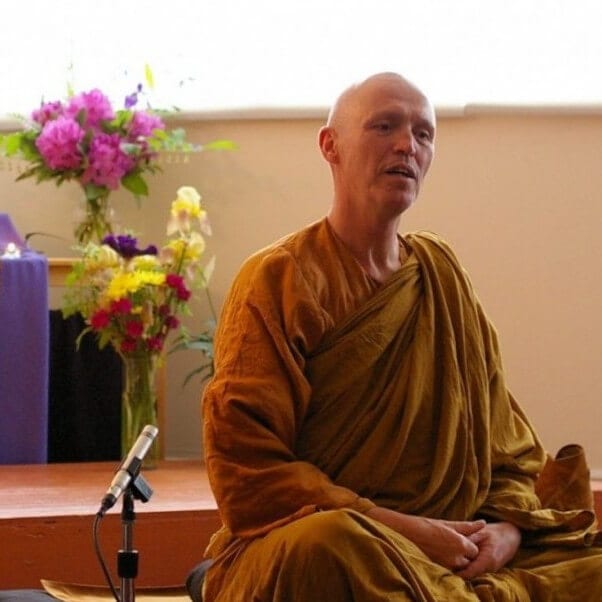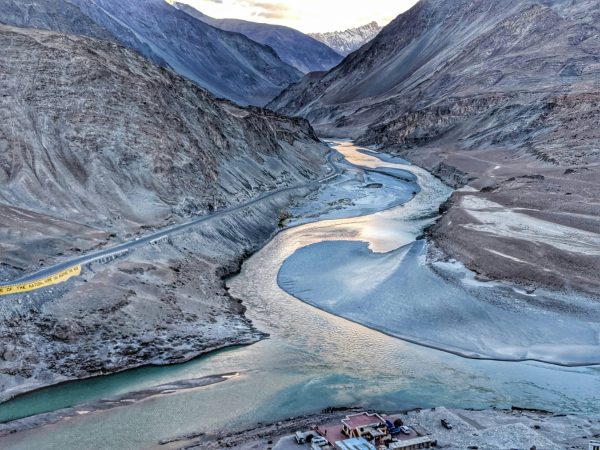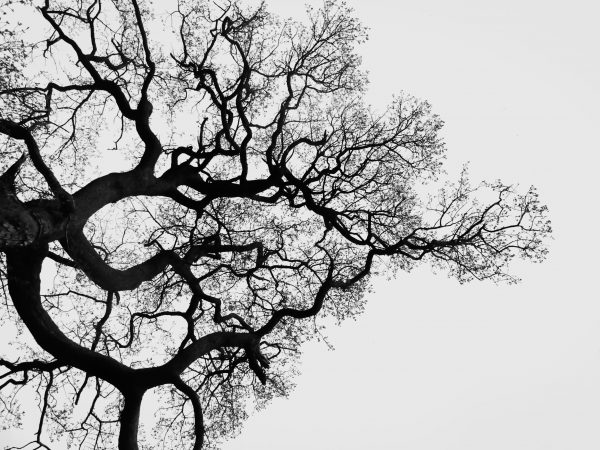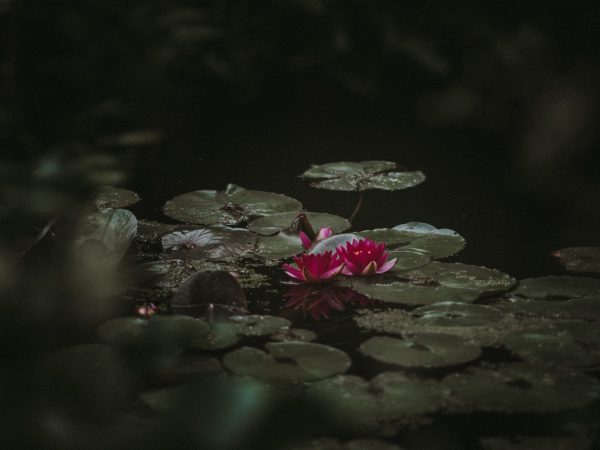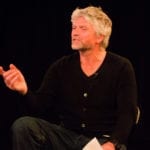When people are inflamed with reckless passion, overwhelmed by corrupt ambitions, entranced by wrong ideas, rainfall decreases. Food is hard to come by. The crops fail and are mildewed and stunted. Because of this many people perish.
The Buddha (Anguttara-Nikaya 3: 56)
It seems important to bring the subject of the environment into a focus for Dhamma practice. I’d like to present a positive response to the interrelated topics of climate change, mass species extinction, runaway overpopulation, over-production and pollution – but positive news is hard to find. Yes, I do occasionally get a free newspaper called ‘Positive News’ but even on their pages a recent item of good news was that the rate of destruction of the Amazon rainforest had dropped by 20% last year. It’s small encouragement to learn that instead of poisoning, defoliating and desecrating our planet and source of livelihood at 100 mph, the effect of Kyoto and Copenhagen and Rio Earth Summit and so on has been to slow it down to 80mph. But perhaps it’s naïve of me to dream of not destroying our source of oxygen and carbon management at all.
Since the planet is the fundamental source of all material things, as long as humans don’t tackle greed, the Earth has to pay the price.
I expect you’ve read about the melting of the polar icecaps and the predicted flooding of coastal areas; or that the amount of rainforest cut down every year is equivalent to the size of Belgium; or that the mining of the Alberta Tar Sands creates open–cast mines the size of England and Wales that seep their poisons into the local watershed; or that there is a zone in the Pacific the size of Texas (at last reckoning) that is a vast swirl of waste plastic. I wonder what you do with that information. Maybe rather than buy a plastic bottle of water, then throw the empty bottle ‘away’, you consider how that plastic contaminates the sea, and finds its way up the food-chain, from small to large fish and so on up to human consumption – and decide not to buy it. I hope you do that rather than recycle it, because extracting, and refining the oil from which plastic is derived, and then recycling the plastic still uses up energy; also three litres of water are used to obtain one litre of the bottled stuff. I hope you also consider abstaining from eating fish, as the oceans have lost 90% of their fish stock since the 1940s, and there might not be that many left soon. Perhaps like me, you might have wondered ‘Is there any way of stopping this?’ I hope you will have avoided sinking into depression; and also of adopting the philosophical shrug: ‘Well, all things are impermanent, and we all have to die.’ But, having been throuwgh all this and more, I’ve come out of dead statistics and into a life based on kamma and ethics. Whatever the results in the external world, whether it is impermanent or not, through the teachings on kamma, the Buddha encourages us to understand the causes and results of our actions and act responsibly. Furthermore to urge others to do so. So rather than resound gloom and despair, this is a good way to live.
Three Timeless Principles
The basis of Dhamma teaching is right view – the acknowledgement of cause and effect; and the basis of Dhamma-practice is heedfulness, appamāda , paying attention. So a Dhamma practitioner uses resources wisely; he or she reflects that every material thing comes from the earth, not the shop; furthermore that everything thrown away goes back to the earth –the source of food, air and water. And furthermore he or she uplifts and exercise good kamma, the basis for happiness in this life and the foundation for awakening. This centres around three timeless principles – generosity/sharing; morality/integrity; and renunciation/living simply. They’re interconnected: we can share when we trust each other, and trust is established when we live morally. Moreover, the qualities of friendship and contentment that come from living morally and sharing lessens the sense-appetites. Hence living more simply. Taken together, these three factors leads to one’s welfare, the welfare of others and to nibbāna1As the Buddha pointed out at Majjhima-Nikaya 19..

From Wikimedia Commons
Monasteries (Buddhist or Christian) exemplify this. Depending on the size of the community, you’re likely to see: two washing machines for fifty adults, not twenty, and often it’s been given by someone who was inspired by the monastic example. (Monks at Cittaviveka routinely wash their own requisites by hand and leave the machine for the communal and guest linen). You might see large solid buildings, but take note that these are for communal and public use, especially at a centre like Amaravati that is used by thousands of people every month. Vehicles? A work wagon, and a car in a large monastery serving up to thirty people; both of these at Cittaviveka are over a fifteen years old and kept going through diligent maintenance and care. We were given a minibus, but hold that for the Sangha in UK as a communal means of ferrying large numbers around. And so on. There’s room for improvement, but we’re paying attention and eager to lessen our consumer footprint. But we represent only a small part of the population.
I’m sure that no one intends to damage our precious Earth, but as a species we’re under the confused impression that Nature will cope with our privations or recover from our abuse.
The place of the Sangha has always been to live close to the earth, and at the margins of the society where their example may be witnessed. At Cittaviveka, we’ve planted many thousands of trees at Cittaviveka, installed a large solar panel, use a renewable wood source for heating, and are investigating the feasibility of using Hammer Stream as a means of generating hydro-electricity. Most forest monasteries from New Zealand and Australia through to California are acting in similar ways. A major theme behind the Amaravati Development Project is to conserve energy by building better-insulated buildings. And if you’re looking for ideas on what you might do, or at least bear in mind, then Ajahn Sona’s presentation on YouTube ‘Energy Efficiency at Birken Forest Monastery’ is a useful source.
Conservation isn’t a classical concern – although a standard of frugality is – but as far as the environment goes, things have changed since the Buddha time. The early Buddhist attitude towards Nature was that the forests offered the monks and nuns a suitable place to withdraw to for Dhamma-practice. Secluded from the turmoil and gloss of the social world, these remote places were ideal settings within which to come to terms with life, death and Nature. At that time species extinction and deforestation were not issues. Pollution only occurred in terms of mind. So the attitude of non-violence was both out of empathy for animals and as a guard against bad kamma of violating life: that was Buddhist ecology.
I’m only a Buddhist monk, so what do I know about economics, but I ask: ‘What do we want – a planet that we can live on or an economy that exhausts us as well as the Earth?’
The Cooperative Cosmos
That attitude remained the case until after the Second World War. But in the 1950s the population of the planet, half what it is today, began to grow rapidly. And as it did so, the forests of S E Asia came crashing down, with Thailand alone losing half of its natural forest after the Second World War. So monks like Ajahn Buddhadāsa began speaking up for Nature:
The entire cosmos is a cooperative. The sun, the moon, and the stars live together as a cooperative. The same is true for humans and animals, trees, and the Earth. When we realize that the world is a mutual, interdependent, cooperative enterprise – then we can build a noble environment. If our lives are not based on this truth, then we shall perish.
Since then environmental concern has risen, and there is an ongoing lineage of ‘ecology monks’ in Thailand who work to preserve forests and encourage conservation.
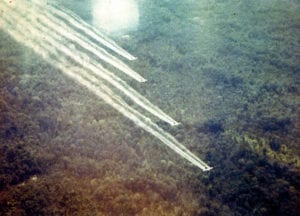

Of course, the Vietnamese monk, Thich Nhat Hanh, exiled and living in the West was also vociferous. He had every right to be. During the Vietnam War, tons of ‘Agent Orange’ (a defoliant that contained an estimated 130 pounds of dioxin) was dumped on his country in order to destroy forest cover and therefore expose the Viet Cong. However there were dire consequences in terms of loss of animal life and human birth defects that continue to this day. (After all, three ounces of dioxin in the water supply of New York City would be enough to wipe out the city’s population.) And on returning to the US, the GIs brought the toxins with them in their bodies. I don’t know much about geo-politics and defending democracy – but if you want to understand interconnectedness and cause and effect, look no further. Come to think of it, didn’t Rachel Carson in Silent Spring way back in 1962 write about the danger of spraying the earth with toxic chemicals? Yet it’s still going on. Someone isn’t paying attention.
Those who do pay attention, and use wise consideration, note that Nature is a closed system: there is no ‘away’ where you can dump stuff, and there’s no other resource for our life. You’re alive as a guest of the planet: so please keep the place clean and leave it in a state in which your children can use it. If you destroy wildlife you damage the system that through producing oxygen and feeding on itself manages the eco-system of the entire planet – and just requires us to allow it do so. This is hardly an esoteric Buddhist teaching. However, as the teachings on kamma point out, we reap the results of our actions both in terms of the mind-set that instigates it, and the body that inherits the physical results. When the motivation is aversion, to get rid of the enemy, the pests, etc., we will surely poison and destroy ourselves.
The Cost of Greed
The kammic consequences of action based on greed are as devastating as those based on war and conflict. Greed is the urge to take more than one needs, an urge that rather than quelling desire propagates and increases it. And since the planet is the fundamental source of all material things, as long as humans don’t tackle greed, the Earth has to pay the price. We could debate over what the average person needs, but the monastic standard of food, clothes, shelter and medicine is a good place to start. Monks and nuns with typical human bodies can get by on that. You might add heating, lighting and a means of transport to that list, but bear in mind that all of these basic requisites, not to mention drinkable water and clean air have to be produced by the Earth. So any need that requires damaging the resource of fertile land, clean water and air is a dangerous one, and should be reduced. However the norm in industrialized societies is to get us to distract our attention, to not consider the mining and the spraying and the oil use that supports transport and imports and plastic everything (plastic comes from oil, right?). Instead we are encouraged to use the resources of the planet to produce gadgets, luxuries and entertainments to compensate for the debilitating effect that the pressure and complexities of modern life have on the human spirit. And above all, the political message is that this will keep the economy growing, and this is a good thing for all of us.
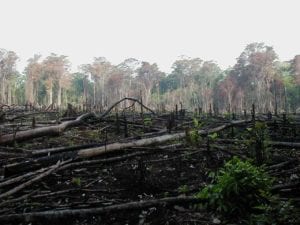

A jungle burned for agriculture in southern Mexico.
From Wikimedia Commons
However, the way that the economy is growing is by converting planetary (and human) resources into money. For instance, the food industry is about making money, not about feeding people. A large amount (estimated 30%-50%) of the food that is produced from the Earth is thrown away2See H.R.H The Prince of Wales: ‘Harmony ’ (HarperCollins, 2010). Also see a report by the Institute for Mechanical Engineers – ‘Global Food; Waste Not, Want Not’ (BBC News report Jan 2013 ). Either the vegetables look too lumpy or the apples to speckled for the market, or the stuff passes its sell-by-date and is dumped, or it gets cooked in a restaurant and the diner doesn’t eat it all. But it has produced money. Probably the most extravagant is the meat industry. According to UN-backed statistics, meat production takes up about 70% of arable land and causes 18 per cent of global greenhouse gas emissions. Yet forests are cleared to create pasture for cattle; and even when land is cultivated for vegetables, some 97% of the planet’s soya beans, and 35% of corn produced in the US is used to feed livestock (and 40% of US corn gets converted into ethanol to fuel cars). Also as cattle wouldn’t naturally survive on land like the Prairies, rearing them means depleting the water table – according to the UN something like 1,500 gallons of water are used to produce one pound of meat. Then of course native species that might use the land or prey on the cattle have to be killed. Why should the meat and dairy industry have such rights to use the fertile Earth, in order to make money? (Incidentally, a EU Commission report last year found that switching to a vegan diet would result in twice the carbon emissions savings of switching to an electric car; and lessen the suffering of more than a billion farm animals each year in the UK alone.)
Put simply, greed kills as surely as hatred.
You could also examine forestry, fishing and mining in such a way; but the statistics get overwhelming. Moreover, the problem is more widespread: all of our overproduction happens because of the need to make money. Healing, teaching, housing, transport, dying – everything costs money. And if money is the dominant factor then we’re governed by something that has no limits to its appetite and that can consume just about anything and still want more. Its appetite is called ‘the economy’ and seen as the item that must always grow and whose welfare is of paramount importance: a major reason for the USA not signing the Kyoto Protocol on Carbon Emissions was that it would ‘damage the economy.’ The economy moves the money around, but its trend is to move much of it one way – into credit to be controlled by a minority and away from the people who have to exist in debt. Even when it is fed and fretted over, periodically the economy still sickens and crashes; so loans are arranged and austerity measures such as lower welfare, zero rate employment and higher taxes imposed. For the welfare of the economy, human society gets divided into those who have too much and those who don’t have enough; the disadvantaged get angry, and then the fists get waved, and the bottles and tear gas start flying around. I’m only a Buddhist monk, so what do I know about economics, but I ask: ‘What do we want – a planet that we can live on or an economy that exhausts us as well as the Earth?’
Put even more simply, greed kills as surely as hatred.
Clearing Away Delusions
Now there would barely be much point in writing all this if there wasn’t any solution. The Buddha’s instruction, and our ongoing Dhamma practice, is to put an end to greed and hatred. And clearing away delusion is a big part of that: to understand the causes and conditions that prevent us from seeing and tackling our appetites and aversions. Now I’m sure that no one intends to damage our precious Earth, but as a species we’re under the confused impression that Nature will cope with our privations or recover from our abuse. As is becoming more apparent, this is a deep delusion. But the heart of the delusion isn’t any particular people, but in the wrong view of the political and economic systems. The political viewpoint – of being separate nations – pits nation against nation, and ideology against ideology; so we lose touch with our empathy for other humans. And an economy that’s bent on converting everything – and everyone – into a marketable item needs to be wisely moderated by restraint and compassion. This may sound hopelessly idealistic. But political will only get aroused by a sea-change in our attitudes. For instance, a major argument against the abolition of slavery was that such a measure would ruin the economy. Well, after a while the moral conscience of human beings found that to be an inadequate argument; and when that moral conscience translated into political resolve, slavery was abolished.
And the economy rolled on as before. So a viable economy will survive as long as there are humans; it just needs to be governed by wisdom. The view that we have to shift from was elucidated by the eminent Thai scholar monk, Ven. Payutto, in his address to the 1993 Parliament of the World’s Religions in Chicago3Published as: A Buddhist Solution for the Twenty-first Century (trans. Bruce Evans). Ven. Payutto is a Chao Khun in the Thai Sangha; his current title is ‘Phra Buddhaghosajahn.’. He outlined three false perceptions from which our social and environmental problems stem:
- The perception that humankind is separate from nature, and that it must control, conquer or manipulate nature according to human desires.
- The perception that fellow humans are not our fellows; the tendency to focus on the differences between us rather than the common ground.
- The perception that happiness is dependent on gaining and keeping an abundance of material possessions.
Completely alone in a world on fire with greed, hatred and delusion, the Buddha decided to teach. Thank goodness he didn’t just shrug and go back to the root of a tree!
And what we have to shift to, through international agreements and networks, is a way of operating that is based on empathy for the world as a whole. After all, one of our regular chants is ‘ I will abide pervading the all-encompassing world with a heart imbued with compassion… ’ and my suggestion is merely that we back up that attitude with some clear thinking. Such as: ethical consumption is an aspect of right livelihood. Remember: What you buy supports that industry. Do you want to support the meat industry? Do you want to support the ongoing use of plastic? Where do you think the plastic came from? And where will it go? What about adopting ‘reduce (consumption), repair and recycle’ as a practice? Because however energy is expended – whether through electricity, Internet use, transport or heating – we are drawing from a finite resource. It could be healthier to share a ride or cycle to work. And for further advice, why not take a look at One Earth Sangha or 350.org? Wisdom is an action, an individual practice based on sharing, generosity and integrity. We need to bring it to bear on how we live in accordance with the Earth’s resources.


The systemic nature of the problem may make it seem that a solution is beyond the reach of any individual, and yet… I reflect on individuals like Wangari Maathai the Kenyan woman who won the Nobel Prize in 2004 for setting up the organization to combat deforestation and promote women’s rights. In her country, women have traditionally had little effective power over the body politic. However by the time she passed away in 2011, Wangari had established the Green Belt Movement that enabled poor women to plant thirty million trees.
Our wise reflection must also bring to mind the example of the Buddha. Completely alone in a world on fire with greed, hatred and delusion, he decided to teach. Thank goodness he didn’t just shrug and go back to the root of a tree! Now as inheritors of his Dhamma, we are advantaged by the precise, pragmatic and progressively uplifting nature of his practice-path. Our lives can be for the welfare of the world; we just need to keep reframing how. Of course, who knows how much we can save of this Earth and our humanity? But we can try; and even that is good kamma: careful consideration and wise action is not beyond any of us in the here and now.
Once you see what it is all about, you really want to be very very careful about what you do and say. You can have no intention to live life at the expense of any other creature. One does not feel that one’s life is so much more important than anyone else’s. One begins to feel the freedom and the lightness in that harmony with nature rather than the heaviness of exploitation of nature for personal gain.
This article was originally published on ajahnsucitto.org. It is reprinted here with permission.
References
- 1As the Buddha pointed out at Majjhima-Nikaya 19.
- 2See H.R.H The Prince of Wales: ‘Harmony ’ (HarperCollins, 2010). Also see a report by the Institute for Mechanical Engineers – ‘Global Food; Waste Not, Want Not’ (BBC News report Jan 2013
- 3Published as: A Buddhist Solution for the Twenty-first Century (trans. Bruce Evans). Ven. Payutto is a Chao Khun in the Thai Sangha; his current title is ‘Phra Buddhaghosajahn.’

